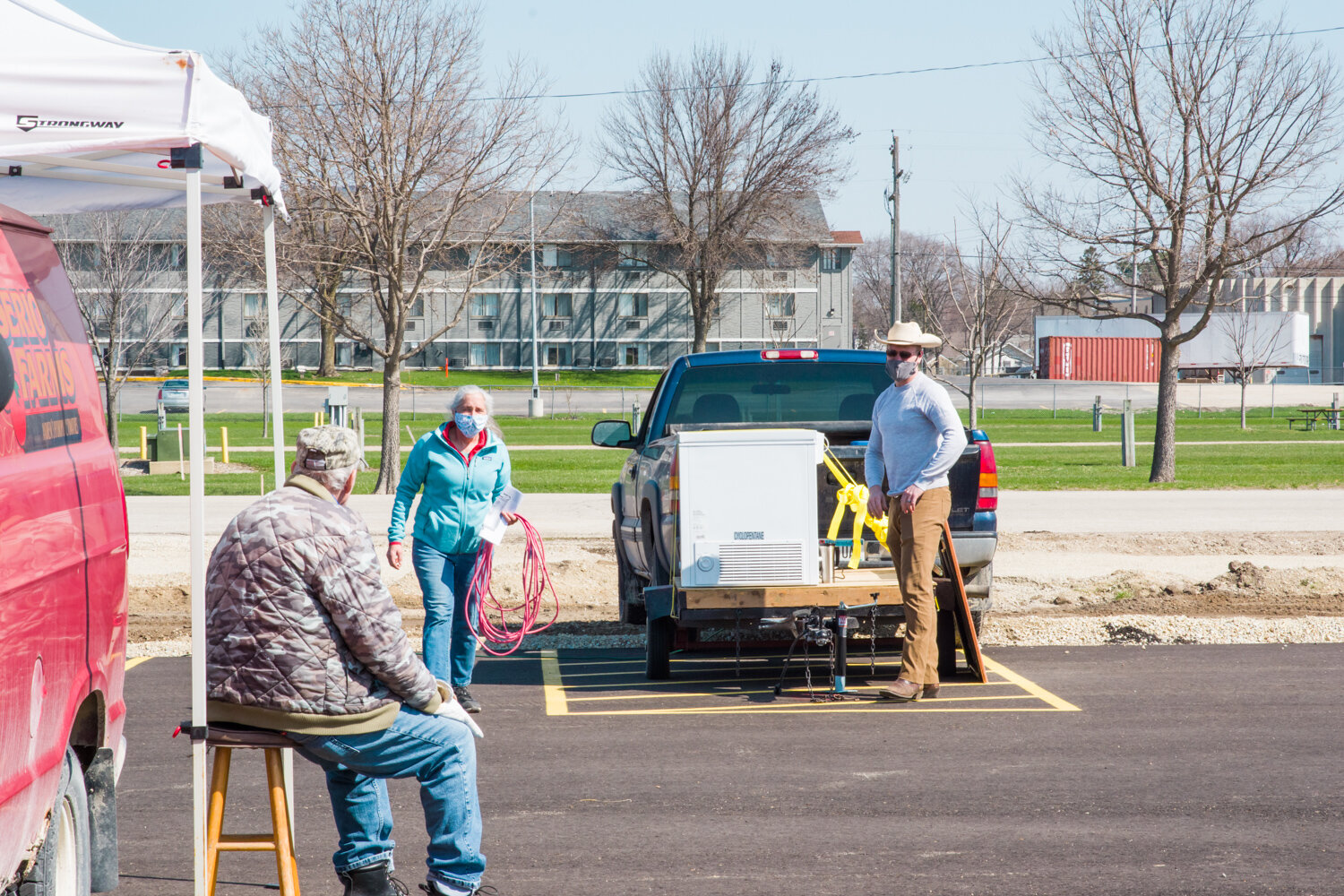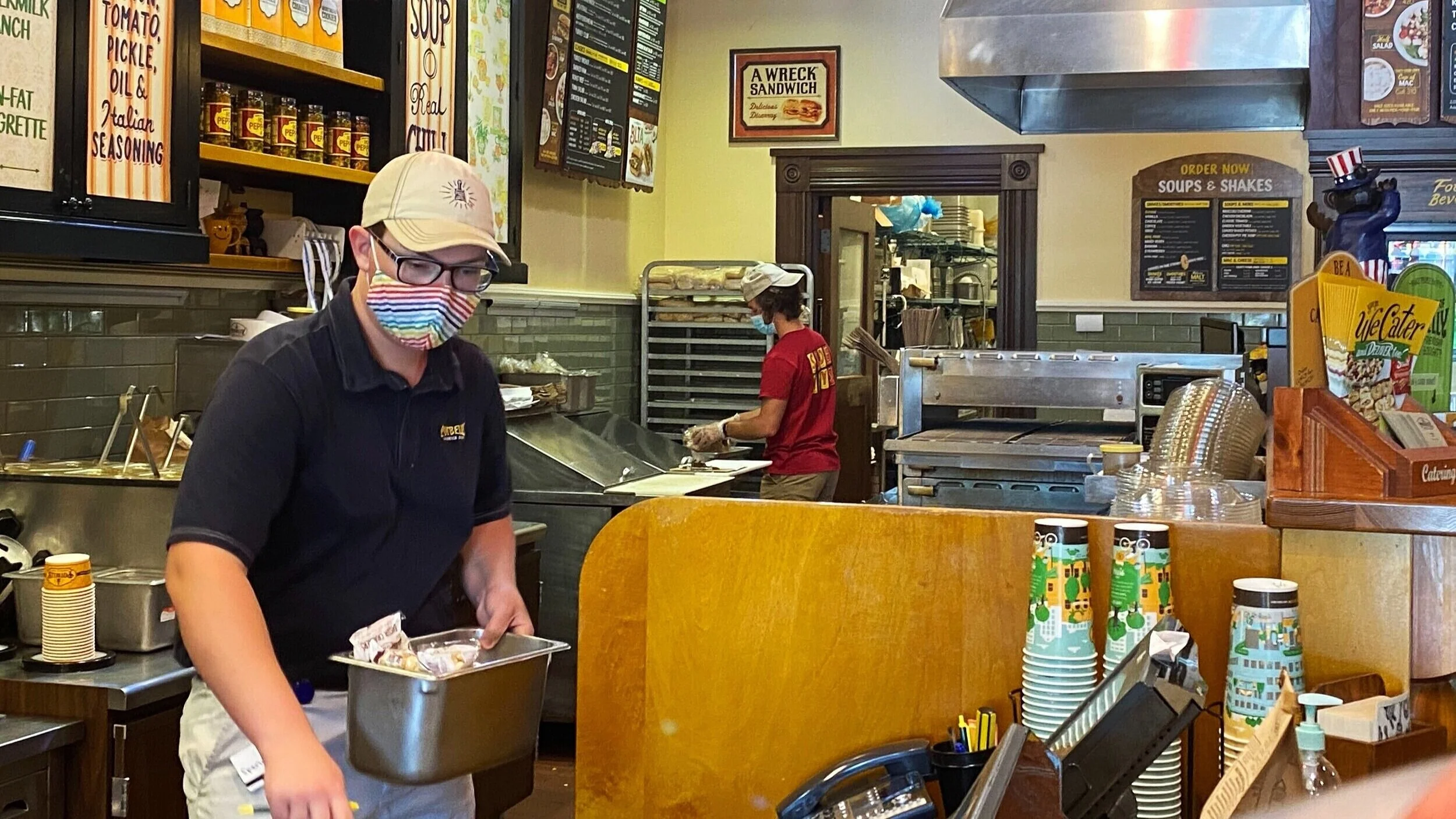Rochester business owners describe the 'roller coaster' of surviving a pandemic
Adam Fredericksen, like so many others, walks a tightrope these days. The balancing act was much easier when his brainchild, Thesis Beer Project, was filled with the cheers of happy customers and the roar of live music for the first eight months of its existence.
Now, though, as we approach our sixth week in quarantine, the taps still sit dry. Chairs still languish on tabletops, untouched by people for over a month. A building that routinely held several hundreds of people in close proximity, playing host to a burgeoning music scene and a thriving craft beer ecosystem, now holds a maximum of two people on a daily basis.
“It’s been a roller coaster of trying to stay abreast of what’s happening and trying to make the best decision for our limited staff and our customers,” said Fredericksen, who co-owns the business with his wife, Allyson. “And at the end of the day, our goal is to survive as a business. So, how the heck do we do all these things and still move enough beer to stay alive?”
For Fredericksen and Rochester’s other small business owners, scramble mode is over and survival mode has set in.
This is in lockstep with the national trend: over half of America’s smallest businesses (less than 20 employees) say revenue has decreased by more than 75 percent since Covid-19 became a widespread national concern. About the same number report their business would be at risk of closing within the next four months if the status quo persists.
There’s a faint light at the end of the tunnel — Gov. Tim Walz’s stay-at-home order is set to expire May 4 (although there is a strong possibility of another extension), and over 80,000 Minnesotan office and industrial workers were allowed to return to work Monday — but the goalposts still shift on an almost daily basis. In the interim, businesses are at once preparing for a new normal, whereby social distancing remains a priority, while also taking creative measures to stay afloat until they are allowed to re-open to guests.
With a state order prohibiting businesses from serving guests in-person, Thesis continues to stay afloat by selling beer in crowlers curbside / submitted
Thesis has resorted to selling crowlers via an online ordering system, which has kept the lights on but only provides half the sales of an average day with an open seating area. Fredericksen said twelve of his thirteen employees have been furloughed; he and the one brewer remaining on staff work 70-hour weeks to keep the curbside pick-up system running smoothly.
“Things have been as good as they can be, I think, so far,” he said. “Obviously, we’d love to sell more, but our worry is if we canned and sold more beer, sometime in the next month, we might run out of cans — and with no end in sight to this, we’re afraid of pushing anything too hard.”
Fredericksen noted several possible options to ease back into reopening — hiring a bouncer to keep track of how many people are in the building, setting up a reservation system, taking tables out and increasing space between tables — but all add a layer of exclusivity and ‘red tape’ to the experience that he says is antithetical to the original vision. Add it all up, and the seating area at Thesis may not open in conjunction with the eventual easing of the stay-at-home order.
“I’m not in any rush to get back to normal until I feel one million percent safe on it,” Fredericksen said. “The last thing I can have on my conscience or on this business is any sort of negativity or a possibility of contributing to bad things happening.”
Taking the long-view
In the downtown area, another relatively new player in Rochester’s food and drink scene is rolling out their newest idea to drum up business.
All 45 employees of Cameo at the Castle were furloughed when restaurants were forced to close in mid-March. Now, about a dozen have returned to help support Cameo’s newest endeavor: Relish, a modified version of Cameo’s menu designed for takeout and delivery launched last Friday. The menu has been reworked to be cheaper, easier to transport, and to include larger-format meals for families.
Zach Ohly, owner and executive chef at Cameo, says the process of pivoting to an online model was necessary to pay bills and stay relevant in the minds of customers. It’s a welcome change for a business which hasn’t seen any revenue for over a month, but the growing pains of an entirely new system of doing business are still real.
“That online integration, for one, cost thousands of dollars, but it’s also about retraining staff on our new normal,” said Ohly. “We’re no longer a full-service restaurant, so now we have to learn this carryout model.”
Ohly also mentioned the writing on the wall in the restaurant industry, even pre-pandemic — with full-service restaurants losing out to more casual options, and greater numbers of customers preferring convenience over experience. Cameo’s success over its year-plus of existence proves there’s still a lane for the full-service restaurant, said Ohly, though don’t be surprised if Relish sticks around even after Cameo’s doors re-open.
“Long term, if this is a viable option, I think we’ll see a transition of business models in the future… less full-service restaurants, more fast-casual, less contact,” said Ohly. “I think that was the wave of the future anyway based on convenience, so we’re just testing the water with a new business model.”
The online exodus has not only hit Rochester’s restaurant industry, but any business where customers aren’t allowed inside. Anna Christian, owner of Rochester’s Pure Barre gym franchise, has been forced to move all classes online for the time being.
When classes are allowed to return to the studio, Christian says they will have to look much different. A ‘check-in’ system will be implemented, where every person entering for a class will answer a few questions on how they’re feeling and possibly get a temperature check. Once inside, there will be more space to move around.
“Our ‘normalcy’ for the foreseeable future is smaller classes,” said Christian. “We’ll be operating at about 50 percent capacity for most classes. Our largest class is about 20 people, and that would drop to eight people immediately. It’s important to be able to adapt to different circumstances, and we’re going to be ready.”
The ‘essential’ tag
Being named an 'essential' business is an important distinction in today's climate — while different businesses deal with various different restrictions, the 'essential' title can keep at least some business flowing.
But even for essential businesses, precautions still need to be taken. That’s the question the Rochester Farmers Markets had to tackle, after being deemed essential as a ‘grocery store’ under Gov. Walz’s guidelines.
RFM director Jim Syverson said the summer market’s impending move to Graham Park gives vendors more space to set up, thereby making it easier for everyone to practice social distancing. He added that concessions will be absent from the market until government restrictions are lifted.
“We’d like to do it so well that people feel comfortable,” Syverson added. “We’re trying to be responsible for what’s going on.”
Vendors participate in a “dry run” to practice setup and best safety practices in preparation for the first outdoor market of the season on May 2 / submitted
Syverson says online sales have skyrocketed in the past month, counteracting a sizable dip in physical sales.
“The winter market has been going, and people have still said ‘we want fresh produce, we want the fresh stuff from our farmers,’” Syverson said. “[The people] have found a different way to do it with our online option, and yet continue to stay safe and be responsible when they go pick it up.”
With the 2020 summer market set to open May 2, Syverson said the market board met three times in April to figure out how best to safely open. According to Syverson, it was never a major consideration to postpone the markets, given their essential status, but conversations are still ongoing about what to emphasize: buying online or showing up in person?
For the time being, Syverson said he is hoping people choose the latter.
“We would still like to drive people back to the physical front and the farmers at the market,” said Syverson, noting the relationship factor between farmer and customer. “[The pandemic] will probably change some buying habits. Are we going to push it that way? I don’t know if we are. We’re still in discussions about where we go, and how we keep customers coming back to local food and the vendors.”
What will the future look like?
Every member of society, business owners and customers alike, are anxiously awaiting the return of ‘normal’ — the day where we can all leave our homes without worrying about the numerous Covid-related buzzwords dropped into our societal vernacular over the past month.
According to one of Rochester's leading voices in the business world, though, it’s too early to start holding our collective breath.
Kathleen Harrington, president of the Rochester Area Chamber of Commerce, says ‘normal’ won’t return until a Covid-19 vaccine is widely available — and general consensus says that won’t happen for another 12-18 months. For the foreseeable future, then, Harrington says a strict cleaning regimen must be the top priority for every business looking to re-open.
“I think people are going to need a higher level of assurance that yes, indeed, the business I’m going to has standards of cleanliness beyond my expectations,” Harrington said.
There are also worries the pandemic is hastening the move to online shopping, which vastly favors larger corporations over small shops that lack the technical know-how to create a streamlined online ordering system.
“We have to really pull together as a community, and realize that if we don’t link arms, we will lose a lot of what makes the character of our city,” said Harrington. “We have to build an even stronger ethos of supporting each other and our local businesses.”
Every business owner quoted in this story mentioned an outpouring of support from their most loyal customers, showing the ‘ethos’ Harrington alluded to already exists in some ways. The community has rallied to pick up as much slack as they can, but the economic impacts of Covid-19 are far-reaching in almost every household in Rochester. A reckoning is quickly approaching (and for some, it’s already here): social distancing on a societal level will render some businesses economically unsustainable.
Thesis isn’t at that point, but Fredericksen has understandably done some thinking on the topic — and if it eventually comes down to money or safety, he knows what side he’s taking.
“This business is my baby,” he said. “I’ve been wanting it to exist for a very long time, and now it’s finally here. It’s not even a year old. This is scary, and we want it to survive this; but also, I’m a human being. My wife is a doctor. My family is a family of nurses. I live in this great town. To me, people come first and foremost, and I would gladly lose this business if it meant whatever decision I had to make allowed people to be safe and healthy.”
In-depth coverage on Med City Beat is made possible thanks to the support of our members. To learn more about becoming a member, visit medcitybeat.com/membership.










